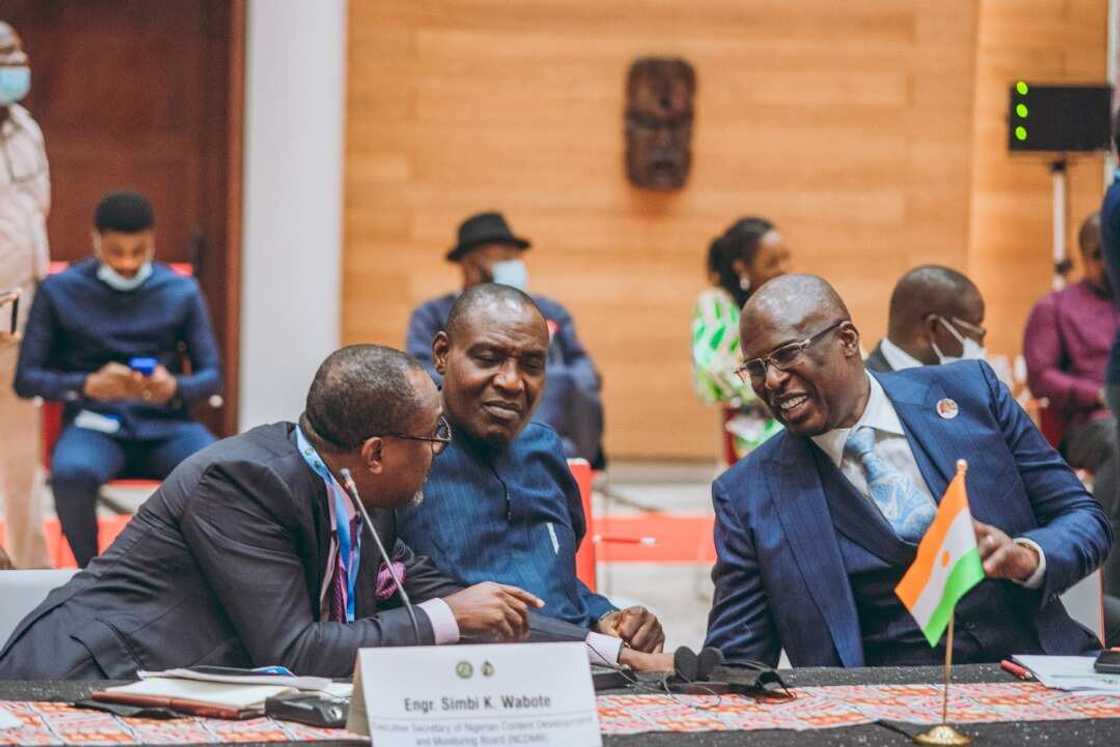Oil & Gas Stakeholders Meet in Yenagoa, Advocate New Local Content Strategy for Africa
- The Nigerian Content Development and Monitoring Board has put Yenagoa, the capital of Bayelsa on the global map
- The small south-south town recently played host to the gaints of the oil and gas industry in Africa
- Far-reaching decisions and brand new policy initiatives were discussed at the maiden conference
PAY ATTENTION: Join Legit.ng Telegram channel! Never miss important updates!
Yenagoa - Stakeholders and policy leaders in Africa’s oil and gas, and other related sectors, have unanimously advocated for a new local content strategy for Africa.
The initiative will focus on adequate regulatory framework, funding, human capacity development, and strategic Research and Development with effective gaps analysis to positively drive the local content narrative.
Experts say the move will serve as an imperative for the domestication and sustainable growth of Africa’s hydrocarbon resources.

Source: Facebook
PAY ATTENTION: Install our latest app for Android, read the best news on Nigeria’s #1 news app
The stakeholders reached the consensus at the maiden edition of the African Local Content Roundtable which was held in Yenagoa, the Bayelsa state capital, and monitored by Legit.ng.
They agreed that funding is critical to driving local content, especially with the negative impact of the COVID-19 pandemic which has affected the economy of most African countries.
Executive Secretary of the Nigerian Content Development and Monitoring Board (NCDMB) Engr. Simbi Kesiye Wabote, while setting the context at the Pan-African engagement, harped on the need for a strong regulatory framework.
He said funding and incentives are critical to implementing local content programmes, develop infrastructure, attract new investments, and keep existing businesses afloat.
He also announced that the Nigerian Content Development Fund has earmarked a $350million intervention fund in partnership with the Bank of Industry (BOI).
Wabote recalled that the Nigerian Oil and Gas Industry Content (NOGICD Act) 2010 as established, makes the NCDMB the sole oil and gas regulator in Nigeria.
His words:
“A sustainable local content practice requires that the right regulatory framework is put in place, regular gap analysis and the setting of targets for gap closure.
“The right resources including funding and incentives are required to build capacities and capabilities. R&D is the key drivers to bring innovation and avoid obsolescence.”
Nigeria’s minister of state for petroleum resources, Chief Timipre Sylva, opined that Africa must now come up with policies that will further deepen the conversations on local content administration.
He added that the success story of the NCDMB as the champion of local content practice in Africa has led to the extension of local content services to other sectors in Nigeria and Africa at large.
He also said Nigeria must also look to explore its 303billion cubic feet of gas reserves.
Other speakers at the event include the secretary-general of African Petroleum Producers Organization (APPO); Omar Farouk Ibrahim, APPO executive board member from Algeria; and chairman, Petroleum Technology Association of Nigeria, Mr. Nicholas Odinuwe.
Others are the commissioner, energy, and mines (ECOWAS), Mr. Sediko Douka and the executive secretary, National Action Committee on AfCFTA, Mr. Francis Anatogu.
Legit.ng had earlier reported that the conference seeks to institutionalize peer review mechanism among African oil-producing countries on local content as a key development imperative for domestication and sustainable growth of Africa’s hydrocarbon resources.
The organisers in a statement sent to Legit.ng noted that over the years, critical stakeholders in the oil and gas sector in Africa have been fascinated by the remarkable impact and achievements of Nigeria in the implementation of the Nigerian Oil and Gas Industry Content Development Act.
Meanwhile, Edo state governor, Mr. Godwin Obaseki, on Tuesday, March 16 called for an upward review of the 13 percent derivation formula due to oil-states in the country.
Governor Obaseki said the 13% due to oil-rich states in the country had remained inadequate for the development of the region.
Source: Legit.ng





